Managua was declared the national capital of Nicaragua in 1852. It is located on the southwestern shore of Lake Managua. It is also the largest city in Nicaragua. The city has a population of almost 2 million, composed predominantly of mixed race and whites.
Managua’s economy is based mainly on trade. It has suffered two devastating earthquakes over the course of the 20th century — in 1931 and again in 1972 — that destroyed the center of the city, which has not been rebuilt. Managua is the economic, political, cultural, commercial and industrial center of Nicaragua.
Spanish is the language spoken here, and the region has a colorful culture, delicious food, popular dances and Catholic tradition.
Typical Urban Home Life
Homes are made of concrete, half concrete and half wood, or wood and zinc. The sizes may vary depending how big the family plot is. Houses can be 5 x 7 meters² or 6 x 10 meters² with two or three divisions for the 5 to 10 family members living in the house. Out of that many people, two or three of them may have a job.
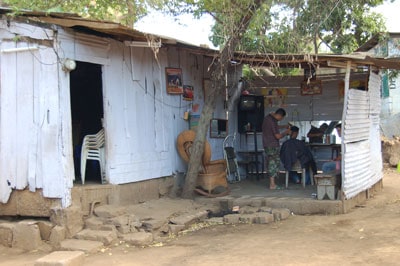
Local Issues
Almost every rainy season, many barrios in Managua are flooded. Escalating use of makeshift canals can be found throughout the city, but those are piled up with garbage that people living near them throw into them every day, which makes stagnant water and different sicknesses like respiratory illness, skin rash, diarrhea and malnutrition.
It is true for all urban regions of Nicaragua that although there is no famine, in some homes families only have one or two meals a day. This can be the result of very little income or no income at all.
The barrios, where child development centers are found, have very few job opportunities. Most women do factory work or domestic work, and men work as security staff and at factories too. The income in these homes ranges between 1,000 and 3,000 cordobas (U.S. $46 – $140) per month.
In the whole country there is a need for jobs. The risk is that many families are separated because one or two of their members leave the country looking for a better life and to support the family they just left. When parents leave to go to work, children are left with grandma, an aunt or neighbor.
Schools and Education
Examples of child development centers in the urban region include:
NI-101, 102, 104, 105, 107-109, 111, 114, 117-122, 124-128, 130-137, 140-145, 147, 148, 150, 151, 153, 154, 157, 158, 160, 162, 164-168, 170, 172-175, 179, 180, 182, 184-186, 188, 190-201, 205, 207, 209, 211-213, 216-220, 222, 223, 225, 226, 230-233, 235-237, 240, 241, 243-245, 247, 248 and 250-252.
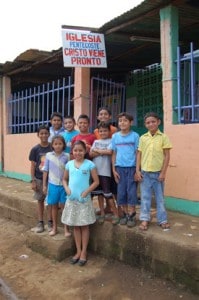
Children at Lirio de los Valles (NI-168) child development center
Very few adults have finished high school; most of them reached only up to third year. Young people do not attend the university because of the cost or they don’t have good grades to enter. In that case parents send them to work at factories or they join a gang.
The school year starts the last week of January or the first week of February and it ends the last week of November. It has a one-week break between semesters in July.
All of the students have to wear a white and blue uniform, white socks and black shoes. The last two years children don’t need to wear uniforms to go to class in all of the country; however, many schools require it to distinguish between students and gang members.
There is a need for better school facilities (i.e., chairs, blackboards, adequate roof, classrooms, and others) and teachers. Some classrooms have up to 50 students and one teacher, in the case of elementary school. In high school it is about the same number of students but one teacher per subject.
The school day runs from 7 a.m. to 12 p.m. and 1 p.m. to 5 p.m. In some cases elementary school operates in the morning and afternoon, but it operates normally only in the morning; high school operates in both schedules.
Church and Religion
Among the evangelical denominations there is no tension at all. They plan and have activities together throughout the year. Per year the church growth is about 20 percent.
The predominant religion in Nicaragua is Catholicism. A second religious group is Protestantism, with 30 percent of the population.
Local Dishes
Grilled meat with rice, beans and fried plantains. Vaho – a dish made of steamed plantains, spicy beef and yams. These two dishes can be made at home or bought at the market. Grilled meat is common to find at popular fried food stalls.
Commonly Used Phrases
- El que escucha consejo, muere de viejo. (He who doesn’t listen to advice won’t grow old.)
- Esos son otros cien pesos. (That’s something else.)
- Anda ve si el gallo puso. (Go see if the rooster put an egg.) That’s when someone comes into a conversation where they are not welcomed.

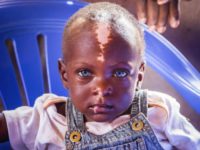
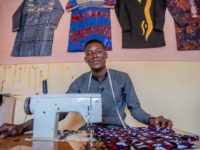

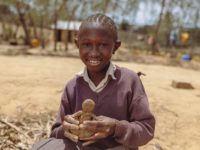


8 Comments |Add a comment
Hello, I am W. Delfs, and I am Nicaraguan born and raised, I married a girl who was sponsored by this program, she would always tell me about the Roberts family who helped her through one of the worst recesions we’ve ever faced, now that our son Is 4 years old my wife insisted we should enroll him in the program even if it is not to be sponsored, just for him to learn the word of Jesús, but we realized through friends and neighbours that the new management has been takin advantage of this great project, children are not receiving anything and management staff Is suddenly wealthier than ever, reach out to the parents to confirm.
Hello William,
Please know that we take situations like this very seriously. I would like more information from you so that we can check in with this project and make sure everything is running properly. Can you please email my team at [email protected] with as much information you have about this so that we can look further into this situation? Thank you so much!
It makes me very frustrated to read about how there is a need for jobs, and yet there is clearly so much work begging to be done, to build adequate homes, schools, sanitation systems for storm water and for garbage removal. Is the government corrupt?
Read up on the current president (Daniel Ortega) and you be the judge. I’m just glad that Nicaragua is stable enough for Compassion to work in — and receptive to Compassion being there. My fervent hope for EVERY country is that Compassion’s Leadership Development Program will produce the next generation of political leaders. Leaders who will govern in a better, more ethical way than the politicians of today. I believe THAT is what will truly help the next generation of children.
•Esos son otros cien pesos. (That’s something else.)
I wonder how “cien pesos” deals with the saying…”100 pesos”. With my limited Spanish, if I hadn’t been given a translation, I would have guessed “That’s a different/other hundred pesos.”
Interesting to learn the phrases, anyway. 🙂
My first sponsor tour was to Nicaragua and I hope to go back soon. It seems surreal that you can actually visit your sponsor kids. Vaya con Dios 😉
I Peter 5:7 “Cast all your anxiety on Him because He cares for YOU!”
Mike
Thank for this additional information. 2 of my kids are from Nicaragua. If you have a rural version, please post. Can’t remember if this is the same update I recieved in the mail or not…
I am very interested in learning about mission opportunities in Managua. My husband has visited Managua on mission three times, but we are hoping to work with Compassion, because we are both teachers and we would like to have an opportunity to support the teachers there or help to do school construction. We are off for two months each summer as well as two weeks in October. I would be very interested in talking to you about ways we could support you on the ground in Managua. We have connections as far as housing is concerned. My husband has a true love for the people of Nicaragua. Thank you for your work.